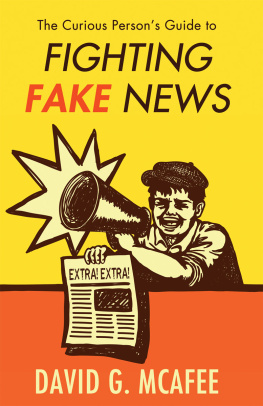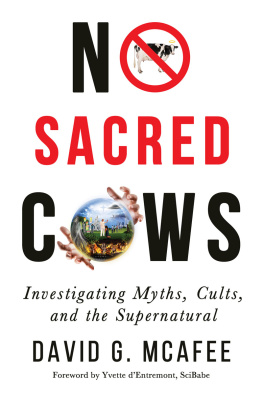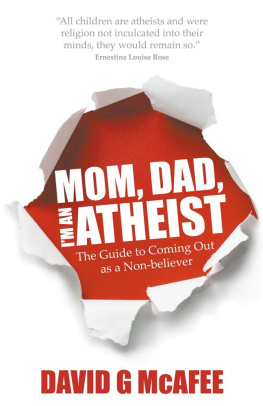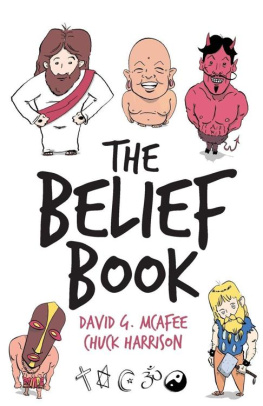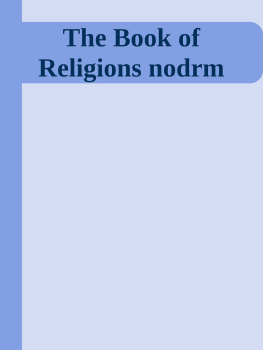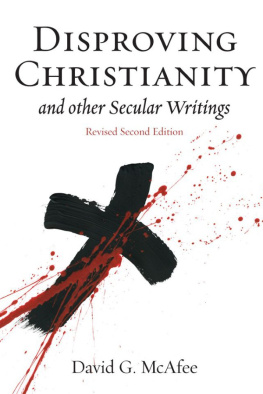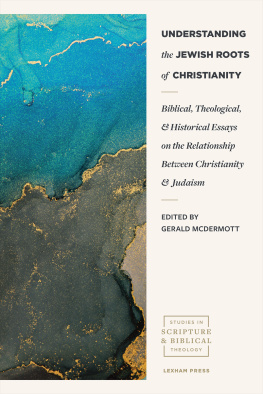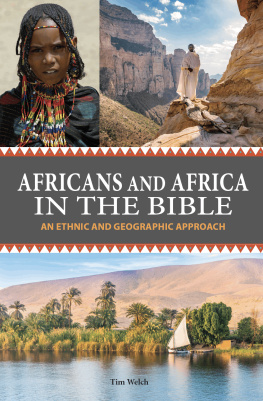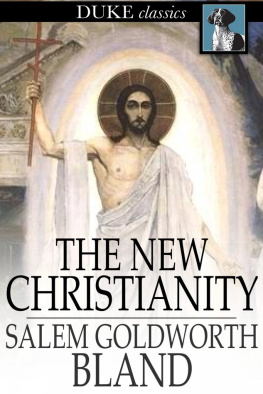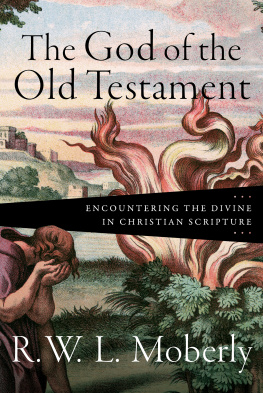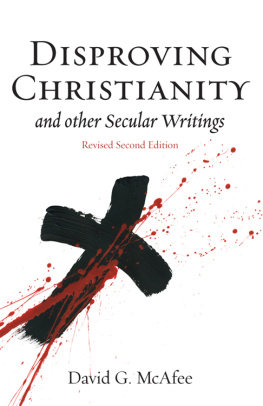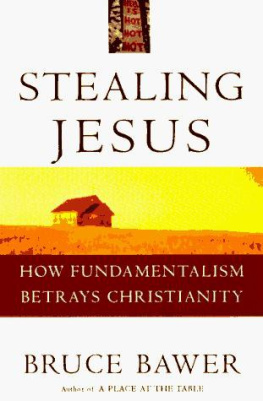Acknowledgements
This book is dedicated to my friends and family for making my research possibleand for always being there for me. Special thanks to Karin Provance, Sharona Belles, Kayla Shadd, and Scott Vining for your specific contributions to this project and for your continued assistance and support.
I encourage everyone to question the things around them, even those they take for granted as being true, and never end the search for evidence. No religion is worth killing or dying for- individual spirituality is the key to happiness. It takes a strong individual to be morally good. I would argue that it takes an even stronger individual to be morally good without the fear of eternal damnation or the promise of an afterlife filled with blissBut would a Christians acts be considered good if they are performed out of fear or potential reward? I believe that true morality is not something that can be manufactured, but a natural state.
For contact information and literature by David G. McAfee, visit www.DavidGMcAfee.com.
Table of Contents
Preface.
Cultural Christianity..
A Brief Introduction to Christianity in America.
Morality vs. Worship..
Mainstream Theories of Disproval
Contradictions in Scripture and in Practice....
Minor Contradictions.
Atrocities and Absurdities Committed or Condoned by the Lord..
Conclusion
Preface
The pages that follow will be focused on the fallacies, improbabilities, and contradictions created by the Christian traditionnot the idea of a God as a whole. Because no one can be completely certain that there is no higher power, it is nearly impossible to disprove; however, it is entirely possible through analysis and research to find discrepancies within the ancient, organized, religious traditions that support the idea of a specific God. Each argument and contradiction presented will bring us closer to disproving the main pillars of Christianity using nothing more than logic, statistics, scientific data, and Holy Scriptures. The debates between Christians and non-Christians have raged for thousands of years, and I expect the conflict to continue. What I hope to gain from presenting these arguments and little-known biblical passages to the reader is a sense of understanding. If read with an open mind, I truly believe that this book will open peoples eyes to the wonders of free thought. We begin with Christianity primarily because it is the worlds most popular religion; adherents of Christian sects compose nearly one-third of the worlds population. Although the arguments will not be centered on the dismissal of a God, ideas and theories contradicting a superior Creator will also be presented, as they are primary tenants of the Christian religion. Under normal circumstances, disproval of a theory or statement is a relatively simple task; if you find one fault or weakness in the argument upon which the theory rests, it is no longer a valid argument. In this case, however, we will be drawing attention to numerous weaknesses and contradictionsprimarily because of the strength a religion can have in ones own mind. The Christian tradition, developed thousands of years ago, has been refined and altered by kings and clergymen alike to fit more appropriately in their time period and culture. With new-age and modern biblical interpretations and translations, this continues even todayit is therefore understandable that, in order to create an appropriate response, all weaknesses of the Bible must be carefully noted, including scriptural evidence from the New and Old Testaments, and teachings of modern Christianity.
With so many books of the Bible and many known and unknown authors, the Holy Bibles words create a battlefield within themselves in which contradictory statements are made, translations are forced, and major and minor edits of each account are made to suit the needs of one generation or the next. It is relatively impossible to consider that it would be flawless in any editionbut I will show evidence that the very concepts of Christianity, acts of God, pillars of belief, and contemporary teachings are contradictory in themselves, in addition to the unnecessary violence, absurd statements, and ideas that we find ridiculous today that are so common in New Testament and Hebrew scriptures. Each of these ideas will be brought to light using biblical evidence; though every argument and contradiction will not make it into this book, there will be enough to inform the average person who is unaware of the true teachings of the sacred Bible. Our evidence in refutations will include passages from the Bible as a whole (as opposed to solely analyzing the New Testament) because the Hebrew scriptures (what Christians refer to as the Old Testament) are no less important and influential to modern Christianity than the New Testament containing the acts of Jesus Christ, as his own words indicate in Matthew 5:17: Think not that I come to destroy the law, or the prophets: I am not come to destroy, but to fulfill. The canonical books of the Torah and other Hebrew scriptures compose the first (and the majority) part of the Christian Bible todayin all versionsensuring that its laws and commandments are taken as divine law to all Christian followers.
Before disproving (or debating) a theory or ideain this case, we will be discussing a religious traditionone must first accomplish a few tasks. The first is to define that which is to be disproven; as Socrates once said, The beginning of wisdom is a definition of terms.; therefore it will be cited in the chapters that follow as the Word of God. There will be various citations and references for Bible verses on many of the arguments; feel free to follow along.
Once all definitions have been established, only then is it safe to present evidence; as far as Christianity is concerned, through the Bible and religious discourse, the evidenceor thesis has already been submitted. We will examine the claims of the Christian Bible, as well as the teachings of the Christian Church, in order to create a successful counterargument. Keep in mind that it is much easier to falsify a claim that it is to verify one beyond a reasonable doubt; this makes our task a relatively simple one. A successful argument will show that the Christian religion, as it is understood today and expressed through the Holy Bible, is not the literal word of God and contains a plethora of contradictions that would make such a claim impossible.
Though many believers in the Christian faith will either disregard the evidence put forth in this book or attempt to refute it, it is impossible to effectively argue the validity of an ancient document that has so many weaknesses and problems. Now, using this biblical critique, we are able to document many of the fallacies and atrocities canonized within the scripture itself, and taught by missionaries and clergymen across the world. Each argument that follows carefully notates references within the Holy Bibleensuring that everyone can follow along as we disprove Christianity.
The Bible is abundantly clear that it is composed of the infallible words of a perfect God, meaning that any imperfections can essentially disprove the book and, therefore, the religion. Most Evangelical and Protestant groups subscribe to a belief in biblical inerrancyin other words, the Word of God (Bible) is infallible and perfectand any inaccuracies are impossible, creating an easily refuted thesis. It is, however, as previously mentioned, still necessary to document as many instances as possible of contradictory statements, absurd claims, and historical misrepresentations in order to completely disprove Christianity. But before we present the evidence against the Holy Scriptures, we must first prove that the Bible is meant to be taken as the literal word of a flawless Lord. The biblical evidence is very clear in this regard; for example, John 10:35 states (emphasis added), If he called them gods, unto whom the word of God came, and the scripture cannot be broken, and the Second Epistle of Peter 1:21 claims that the Bible was not written by men in saying that the prophecy came not in old time by the will of man: but holy men of God spake as they were moved by the Holy Ghost. Last, but certainly not least, Revelations 22:19 claims that if any man shall take away from the words of the book of this prophecy, God shall take away his part out of the book of life, and out of the holy city, and from the things which are written in this book.


